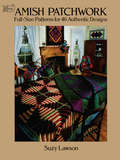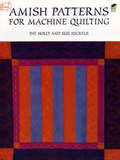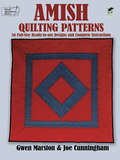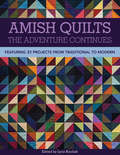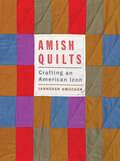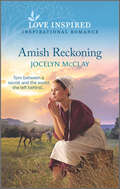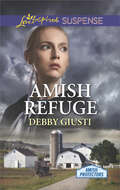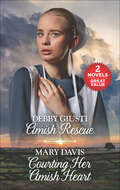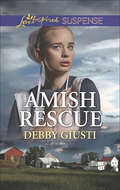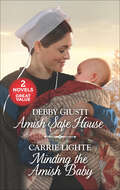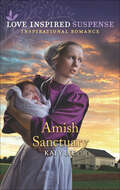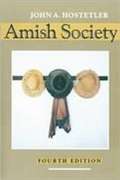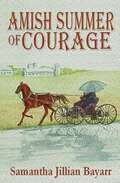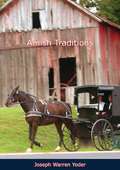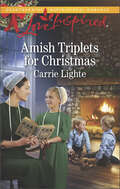- Table View
- List View
Amish Patchwork: Full-Size Patterns for 46 Authentic Designs (Dover Quilting)
by Suzy LawsonThis treasury of Amish patchwork artistry will introduce quilting enthusiasts to a wealth of traditional designs as ingenious as they are beautiful. Based on concepts and unwritten rules that have long governed Amish quiltmaking, most of these lovely patterns date from the late 1800s to the early 1930s.Ms. Lawson, a well-known quilt designer, first devotes a chapter to Amish color combinations, color suggestions, and possible decorative combinations. She then goes on to offer expert advice on borders, patterns, quilting, backing and binding, and more.Dimensions, full-size patterns, and over 100 black-and-white illustrations show how to make 48 beautiful Amish-style quilts, including such intriguing examples as "Botch Handle," "Hole in the Barn Door," "Sunshine and Shadow," and "Wild Goose Chase." In addition, you'll find patterns and instructions for creating such favorite quilting designs as teardrops, feathers, cables, stars, baskets, and floral and foliate motifs.Often spectacular, embodying an amazing diversity of patterns and combinations, Amish quilts are among the most sought-after of all quilting patterns. This book provides a comprehensive, inexpensive source of Amish quilt motifs geared to needleworkers at all levels of expertise.
Amish Patterns for Machine Quilting
by John W. Lee Pat HollyAn easy-to-follow guide translates traditional hand-quilted Amish designs into convenient sewing machine patterns. The 83 heirloom-quality designs -- including flowers, feathers, cables, baskets, stars, and more -- can be adapted in size, shape, or any other aspect. A brief history of the Amish, diagrams, and simple instructions are included.
Amish Pies: Traditional Fruit, Nut, Cream, Chocolate, and Custard Pies
by Laura Anne Lapp60 sweet and savory authentic Amish pies from a real Amish author! The Amish are known for their delicious baked goods and Amish author Laura Lapp has been making pies of all sorts since she was a child in their Lancaster area Amish community. Passed down from real Amish grandmothers, tattered recipe boxes, and old books and diaries, here is an assortment of delicious sweet and savory pies that have been and continue to be popular in eastern Pennsylvania, particularly in the Lancaster area. Now you too can enjoy the scrumptious pies of old order Amish cooks. Prepare to make wonderful treats such as: Shoofly Pie Apple Pie Fresh Peach Pie Lemon Sponge Pie Frozen Strawberry Pie Snitz Pie Oatmeal Pie Vanilla Pie Easy Peanut Butter Pie Sweet Potato Pie Chocolate Chip Cookie Pie Butterscotch Pie Chicken Pot Pie And more! These recipes will soon become your family favorites and go-to desserts for holidays, Sunday dinners, and potlucks. With simple ingredients and instructions that are easy to follow, you'll find yourself whipping up the same wonderful and comforting pies you'll find in Amish country.
Amish Protector (River Haven #2)
by Marta PerryIn River Haven, a mysterious visitor brings two lonely hearts together…Joanna Kohler treasures the independence her Amish quilt shop provides. She rarely leans on others, yet finding an injured woman on her property makes her grateful for the store owner next door, Noah Troyer. Calm and unflappable, Noah offers support. He also points out the strong resemblance between Joanna and the unconscious stranger…Noah may admire Joanna, but the bishop’s daughter is out of reach. Though he’s made a good life, Noah still feels shadowed by the shame his father brought on the community. But it’s his duty to aid his lovely neighbor, especially when danger draws close. As he and Joanna unearth answers about her past, Noah will have to confront his own if he’s to have a chance at building a future with the woman he’ll love forever.
Amish Quilting Patterns: 56 Full-Size Ready-to-Use Designs and Complete Instructions
by Joe Cunningham Gwen MarstonAuthentic Amish quilting patterns are among the most sough-after quilting styles today. Elegant and graceful, these eye-catching designs are widely recognized as a unique art form. Now with this useful guide, prepared by two noted quilt designers and teachers, needleworkers at all levels of expertise can re-create many popular Amish motifs passed down from generation to generation.Over 50 full-size, ready-to-use templates provide attractive designs for feathers, flowers, pinwheels, tulips, cables, pumpkin seeds, a star, and much more. Easy-to-follow instructions and numerous diagrams allow beginning as well as advanced quilters to undertake a variety of projects, while an informative introduction points out the differences between Lancaster County and Midwestern Amish styles.Useful for creating repeating borders, centers, corners, and overall patterns for full-size bedcovers, these classic designs can also be used individually to embellish pillows, cushions, and countless other domestic items.
Amish Quilts, The Adventure Continues: Featuring 21 Projects from Traditional to Modern
by Lynn KoolishThis volume features 21 Amish-inspired quilts by some of today's top quilt designers—with simple patterns showing off beautiful solid fabrics.Thirty years after Roberta Horton’s classic, An Amish Adventure, introduced quilters to the joys of Amish quilting, the editors at C&T Publishing are proud to bring you the adventure's next chapter. Along with the 21 featured quilt projects, this volume includes a gallery of 17 more beautiful quilts and an introduction by Roberta herself on what makes a quilt Amish.Some of the quilt projects in this volume use traditional 19th-century patterns. Others offer distinctly modern takes on Amish ideas. They all celebrate the simplicity, the bold geometry, and the rich dark fabrics that give Amish quilts their ageless appeal.
Amish Quilts: Crafting an American Icon (Young Center Books in Anabaptist and Pietist Studies)
by Janneken SmuckerThe definitive study on the history, meaning, art, and commerce of Amish quilts.Second Place Winner of the Design and Effectiveness Award of the Washington PublishersQuilts have become a cherished symbol of Amish craftsmanship and the beauty of the simple life. Country stores in Lancaster County, Pennsylvania, and other tourist regions display row after row of handcrafted quilts. In luxury homes, office buildings, and museums, the quilts have been preserved and displayed as priceless artifacts. They are even pictured on collectible stamps. Amish Quilts explores how these objects evolved from practical bed linens into contemporary art.In this in-depth study, illustrated with more than 100 stunning color photographs, Janneken Smucker discusses what makes an Amish quilt Amish. She examines the value of quilts to those who have made, bought, sold, exhibited, and preserved them and how that value changes as a quilt travels from Amish hands to marketplace to consumers. A fifth-generation Mennonite quiltmaker herself, Smucker traces the history of Amish quilts from their use in the late nineteenth century to their sale in the lucrative business practices of today. Through her own observations as well as oral histories, newspaper accounts, ephemera, and other archival sources, she seeks to understand how the term "Amish" became a style and what it means to both quiltmakers and consumers. She also looks at how quilts influence fashion and raises issues of authenticity of quilts in the marketplace.Whether considered as art, craft, or commodity, Amish quilts reflect the intersections of consumerism and connoisseurship, religion and commerce, nostalgia and aesthetics. By thoroughly examining all of these aspects, Amish Quilts is an essential resource for anyone interested in the history of these beautiful works.
Amish Reckoning
by Jocelyn McClayTorn between a secret and the world she left behind…She can have him…or her secrets.But keeping them both could mean losing everything.A new client is just what Gail Lapp’s horse transportation business needs to survive. But as the single mom works with Amish horse trader Samuel Schrock, she’s pulled back into the world she left behind. And even though returning to her Amish life is enticing, it isn’t possible if she wants to keep the truth about her past hidden…USA TODAY Bestselling Author
Amish Redemption: Amish Redemption A Dad For Her Twins Small-town Bachelor (Brides of Amish Country #14)
by Patricia DavidsUSA Today–Bestselling Author: He dreams of a new life and a new love—but can he ever overcome her father’s disapproval?Joshua Bowman is ready to go home. After spending time in prison for a crime he didn’t commit, he’s putting everything behind him and reconciling with his fractured family. When a devastating tornado throws him unexpectedly into the path of Mary Kaufman and her daughter, Hannah, he feels the first spark of life after months. But Mary’s adoptive dad is the Englisch sheriff—and he’d never trust her care to a man with Joshua’s past. Plus the lovely single mom has a secret of her own, one that she’s spent years running from. Together they survived the storm, but are they strong enough to shed the shadows of their past?Praise for Patricia Davids’ novels“Uplifting . . . will have fans of Amish romance eager to read more from Davids.” —Publishers Weekly“Patricia writes with heart, integrity and hope. Her stories both entertain and edify—the perfect combination.” —Kim Vogel Sawyer, bestselling author of The Tapestry of Grace
Amish Refuge (Amish Protectors)
by Debby GiustiA woman fearing for her life finds safety—and unexpected love—in this award-winning author’s romantic suspense novel.Miriam Miller barely escapes the ruthless attacker that killed her mother and kidnapped her sister. Running deeper into the woods, she’s running out of hope—until she falls into the arms of an unlikely bodyguard—a peaceful Amish farmer.Something about Abram Zook inspires her trust, but even in bucolic Willkommen, Georgia, Miriam faces danger. Both from the men pursuing her and from her growing feelings for the caring—though guarded—widower who protects her. Because if she falls for Abram she’ll have to embrace his Amish faith as her own—or lose him.With each minute, her abductor creeps closer, pushing Miriam to an inevitable choice: stay and risk her heart—or leave and risk her life.Amish Protectors seriesAmish RefugeUndercover AmisAmish RescueAmish Christmas Secrets
Amish Rescue and Courting Her Amish Heart: Amish Rescue Courting Her Amish Heart
by Mary Davis Debby GiustiTwo Amish Tales of Homecoming and Forever LoveAmish Rescue by Debby GiustiEnglischer Sarah Miller escapes her captor by hiding in the buggy of an Amish carpenter. Joachim Burkholder is her only hope—and donning Plain clothing is the only way to keep safe and find her missing sister. But for Joachim, who’s just returning to the Amish, the forbidden Englischer is trouble. Trapping her kidnapper risks his life, but losing Sarah risks his heart.Courting Her Amish Heart by Mary DavisReturning home after fourteen years in the Englisher world, Kathleen Yoder knows practicing medicine means sacrifice—no Amish man will want a doctor for a wife. Widowed Noah Lambright offers a cottage as her new clinic, seeing how much Kathleen’s skills can help their community. But as their friendship deepens, could love and family become more than a forbidden dream?
Amish Rescue: Mission To Protect Amish Rescue Witness In Hiding (Amish Protectors)
by Debby GiustiHope, safety, and love await a woman on the run in this romantic suspense novel from an award-winning author.Englischer Sarah Miller escapes her captor by hiding in the buggy of an Amish carpenter. Joachim Burkholder is her only hope—and donning Plain clothing is the only way to keep safe and find her missing sister.But for Joachim, who’s just returning to the Amish, the forbidden Englischer is trouble. Trapping her kidnapper risks his life, but losing Sarah risks his heart.Amish Protectors seriesAmish RefugeUndercover AmishAmish RescueAmish Christmas Secrets
Amish Romance at Christmastime: Three Novels in One Volume
by Linda BylerBestselling Amish novelist Linda Byler&’s three heartwarming Christmas romances—in one affordable volume! Linda Byler is beloved for her skillful story telling and true-to-life descriptions of Amish food, faith, and culture. As an Amish woman herself, she can share details of Amish life that few can replicate. Here are three heartwarming novellas full of longing, tragedy, complicated feelings, and ultimately love.The More the Merrier: When Eli Miller passes away unexpectedly, and then a fire destroys their barn, Annie has no idea how she and her eight children will make ends meet. When she begins a friendship with a widower with six children of his own, Annie embarks on a new journey that will transform her and her large, complicated family. A Dog for Christmas: After years of loneliness and longing, Henry is finally rewarded with a hard-won love, a family to call his own, and a new best friend. Could there possibly be a better gift than that? A beautiful Christmas story of quiet triumph in the face of lifelong adversity.A Horse for Elsie: When tragedy strikes in the Amish community, Elsie is forced to let go of her teenage angst and grow up quickly. But sometimes letting go of one&’s desires has a way of allowing one to accept something even better. A tale of longing, desperation, and finally hope, this is a heartwarming Christmas tale to be remembered.
Amish Safe House and Minding the Amish Baby
by Debby Giusti Carrie LighteChildren in need of protection bring couples together in love and family these two inspirational romances set in Amish country.Amish Safe House by Debby Giusti After Julia Bradford’s son witnesses a gang shooting, hiding in witness protection on Abraham King’s Amish farm is the only hope the Englischer and her children have. Even as danger closes in, Julia is drawn to the community’s peaceful ways—and Abraham, an ex-cop turned Amish protector. But when their location is discovered, can Abraham protect her family…and possibly have a future by her side? Minding the Amish Baby by Carrie Lighte Amish store clerk Tessa Fisher isn’t ready for marriage or a family—until a baby girl is abandoned on her doorstep. Now Tessa and her gruffly handsome landlord, Turner King, must mind the baby together. And soon Turner and the sweet-cheeked child are burrowing into Tessa’s heart. Tessa just might be ready for this temporary family to become permanent—if Turner is ready to trust…
Amish Safe House: An Anthology (Amish Witness Protection #2)
by Debby GiustiHiding in Plain SightThe second thrilling Amish Witness Protection novelAfter Julia Bradford’s son witnesses a gang shooting, hiding in witness protection on Abraham King’s Amish farm is the only hope the Englischer and her children have. Even as danger closes in, Julia is drawn to the community’s peaceful ways—and the ex-cop turned Amish protector. But when their location is discovered, can Abraham protect her family…and possibly have a future by her side?
Amish Sanctuary
by Katy LeeFleeing danger, a woman returns to the community—and man—she left behind in this suspense-filled romance from the author of Amish Country Undercover.A woman on the run. A baby in danger.Can her Amish ex-fiancé save them?To keep her patient’s baby safe from a killer, counselor Naomi Kemp will do things she never thought possible, like return to her Amish hometown—and her ex-fiancé. Widower Sawyer Zook can offer Naomi and the baby protection and a place to hide. But Sawyer can’t shield Naomi from what threatens her most: the traumatic past that drove her away years ago . . .
Amish School (People's Place Book Ser. #6)
by Sara FisherRevised Edition! Sold more than 50,000 copies in earlier editions! The Old Order Amish believe that school prepares children for the Amish way of life, for the responsibilities of adulthood, and for eternity. Most communities conduct their own schools, usually taught by Amish teachers. Sara E. Fisher, an Old Order Amish woman, taught a one-room school for seven years. This is her fascinating insider's view of a typical Amish school. Includes "Diary of an Amish Schoolgirl." This authoritative book on Amish education deals with many questions: Why do the Amish have their own schools? How are teachers chosen? How are the parents involved? What curriculum materials are used? What about children with special needs? Co-author Sara Fisher writes from her experience as an Amish schoolteacher; co-author Rachel Stahl writes from her years of extensive research.
Amish Secrets (River Haven #3)
by Marta PerryRachel Hurst sacrificed the life she wanted to stay home and care for her father and siblings after her mother’s death. But now her father has decided to remarry, and there’s no room for Rachel. Desperate to find a job, she accepts the position of housekeeper for a wealthy elderly woman in her isolated mansion.Jacob Beiler thought he had gotten over Rachel’s rejection, but when she arrives as the new housekeeper, he is battered by both joy and bitterness at seeing her again.When odd near accidents threaten the elderly woman’s well-being, her relatives are quick to point fingers, but Rachel suspects someone is intent on harming her employer. When no one believes her, the only person she can turn to for help is Jacob. With danger deepening, Rachel faces a situation that could cost her life…and will certainly break her heart once again.
Amish Sleigh Bells: An Uplifting Inspirational Romance (Amish Country Matches #6)
by Patricia JohnsThey&’re worlds apart. Can love unite them? Spending yet another Christmas without a husband isn&’t something Lydia Speicher is looking forward to this season. Helping the new veterinarian, Thad Miller, navigate his way around the local farms is a welcome distraction, despite the Beachy Amish man&’s shocking customs. But when Lydia accidentally crashes Thad&’s truck and he&’s forced to borrow her family&’s sleigh, liberal Thad must live the conservative Old Order way of life until it&’s fixed. Lydia and Thad couldn&’t be more different, but while working together highlights their similarities, are they willing to change for love?From Love Inspired: Uplifting stories of faith, forgiveness and hope.Amish Country Matches Book 1: The Amish Matchmaking DilemmaBook 2: Their Amish SecretBook 3: The Amish Marriage ArrangementBook 4: An Amish Mother for His ChildBook 5: Her Pretend Amish BeauBook 6: Amish Sleigh Bells
Amish Society (4th Edition)
by John A. HostetlerHighly acclaimed in previous editions, this classic work by John Hostetler has been expanded and updated to reflect current research on Amish history and culture as well as the new concerns of Amish communities throughout North America.
Amish Soups & Casseroles: Traditional Comfort Food Favorites
by Byler Linda Laura Anne Lapp Anna Kauffman Emily Stoltzfus75 authentic Amish soups, stews, casseroles—and delicious bread to go with them. Gathered from interviews with real Amish grandmothers, tattered recipe boxes, and old books and diaries, here is an assortment of delicious baked goods that have been and continue to be popular in eastern Pennsylvania, particularly in the Lancaster area. Now you too can experience the warm, comforting recipes of old order Amish cooks. Prepare to make wonderful treats such as: Chicken Corn SoupHam, Green Beans, and Potato StewBeef Vegetable SoupRivvel SoupBreakfast CasseroleGreen Bean and Sausage CasseroleRoasht (or Chicken Filling)Becky Zook BreadPotato RollsAnd more!These recipes will soon become your family favorites and go-to meals for church suppers or potluck dinners. With simple ingredients and instructions that are easy to follow, you'll find yourself whipping up the same wonderful and comforting meals you'll find in Amish country.
Amish Summer Of Courage: Book Six
by Samantha BayarrLizzie's troubled past has finally come full circle. When Levi Schrock shows up to work as a hired hand on her father's farm, no one suspects he has anything to hide. A chance meeting with her daughter, Rachel, on his first day in town could change Levi's mind about his plans, as wellas his heart.
Amish Sweethearts: Four Novellas
by Amy ClipstonLove is in the air in these four sweet romances!Love and Buggy Rides (previously published in An Amish Harvest)Janie Lantz is a cashier at Lancaster Souvenirs and Buggy Rides, where Jonathan Stoltfuz is a buggy driver. A frightening accident brings Janie and Jonathan together in a blossoming friendship, yet daunting obstacles stand between them and something deeper. Can love kindle into flames that burn away fear and regret—and lead them to a life together?A Home for LindsayFrom Amy Clipston&’s beloved Kauffman Amish Bakery series comes Lindsay Bedford&’s story. Lindsay is happily looking forward to the day she becomes Matthew Glick&’s wife and is excited for the plans he has for the house he will build her. So, when Matthew suddenly calls off the wedding, she is blindsided. She knows there is more to the story than what he is telling her, but will he open up and let her in on his own heartbreak?Where the Heart IsTobias Smucker is back home, and it&’s no secret he and his father are still not on the best of terms. But what is surprising is that his little sister&’s best friend, Mariella, has been harboring her own secret feelings for Tobias. With her help, he begins to unravel a family mystery and learns that everyone has their own hidden depths, including his father.Love Birds (previously published in An Amish Market)While Ellie Lapp and her mother are still mourning the loss of her brother, Seth, Ellie starts working at one of the gift shops in town. Seth&’s friend Lloyd is talented at carving wooden birds, but his father disapproves and expects him to take over the family farm someday. Ellie sees the beauty in Lloyd&’s creations and insists Lloyd sell the birds in the gift shop where she works. As Ellie and Lloyd spend more time together, they begin to develop feelings for one another, but she accidentally betrays his trust. Will she lose any hope of a future with him?
Amish Traditions
by Joseph Warren Yoder“Joseph Yoder (September 22, 1872 – November 13, 1956) was an educator, musicologist, and writer, the first successful Mennonite literary figure in the United States, especially known for his semi-fictional account of his mother's life, Rosanna of the Amish (1940), and for his investigation of the sources of the Amish tunes of the Ausbund, along with his efforts to record and preserve traditional Amish music.”-Wiki“I felt that someone who knows the Amish should write a truthful book about them and show the world their good qualities, instead of magnifying; their peculiarities. So, after thinking about it for about twenty years, and after reading a book called “Straw in, the Wind,” which I thought was very unfair, I determined to write my book, “Rosanna of the Amish.” But may I say that writing a book is no small job. First, it takes a lot of work; second it takes a lot of money to have it printed, but those are not the worst things to think about. What are you going to do if the people do not like your book, do not buy it, and you lose everything you put into it? Even though these discouraging things stared me in the face, I wrote it anyway, and may I say without boasting, that since seven printings have already been made and the book is still selling well, and every now and then I receive a letter from some far off country saying how much they liked Rosanna of the Amish, I am not sorry that I wrote it.”-From the Author’s introduction.
Amish Triplets for Christmas
by Carrie LighteA widowed Amish father finds new hope—and love—with the help of a teacher in this inspirational holiday romance.Widowed father of triplets Sawyer Plank knows he has his hands full. After arriving in the Amish community of Willow Creek to help with the fall harvest, Sawyer asks schoolteacher Hannah Lantz to be his nanny. With a deaf grandfather to care for, the offer is more than just a job for Hannah—it’s a chance to fulfill her all-but-forgotten dream of being a mother. The children soon flourish under Hannah’s watch, and though Sawyer never dreamed he’d find happiness again, he can’t pretend he’s not falling for her, too. But with the holiday season heralding Sawyer’s return to Ohio, can he make his Christmas wish to stay a family come true?
